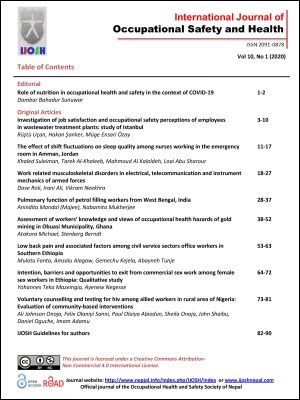Low back pain and associated factors among civil service sectors office workers in Southern Ethiopia
DOI:
https://doi.org/10.3126/ijosh.v10i1.29883Keywords:
Associated factors, Low back pain, Prevalence, Office workers, Sodo townAbstract
Background: Low back pain is one of the most common work-related health problems among office workers. Low back pain has been identified as one of the most costly disorders among the worldwide working population. However, there is a lack of information on associated factors with low back pain which makes people not to work properly.
Objectives: This study was aimed to assess the prevalence and factors associated with low back pain among civil service sectors office workers in Southern Ethiopia.
Methods: Institution based cross-sectional study was conducted among 625civil service sectors office workers, who work in the sitting position, in Sodo town, Southern Ethiopia from March 10 to June 20, 2017. The sampling frame was obtained from civil service office and simple random sampling technique was used for each stage. Data was collected by using a pretested structured questionnaire adapted from Standardized Nordic musculoskeletal Questionnaires and modified Oswestry through face to face interview and by using checklist for observations, which was measured by diploma nurses. Descriptive statistics like frequency, percentage, mean, median and standard deviation were conducted. Also, binary logistic regression was conducted and variables with p<=0.20 in bivariate analysis were fitted into the multiple logistic regression models to identify factors associated with low back pain. Variables with P value <0.05 were considered as statistically significant predictors of low back pain.
Results: Out of the calculated sample size, 625 participants responded making a response rate of 99%. The 12-month prevalence of low back pain among civil service sectors office workers in this study was (38.4%) 95% CI: (0.34, 0.42).This study found that, being obese (AOR [95%CI] =6.3[4.29 - 9.09]), having smoking history (AOR [95%CI] =5.2[2.57 - 10.82]), poor sitting posture (AOR [95%CI] =2.6[1.61-4.30]), having job stress (AOR [95%CI] =5.9[3.44-10.25]), having no rest break during workday (AOR [95%CI]=3.2[1.82-5.62]), sitting >6 hours per day (AOR [95%CI]=16.08[14.4-19.3]) and frequently using computer (AOR [95%CI]=4.3[2.09-5.47]) are significantly associated with low back pain.
Conclusion and recommendations: The 12-month prevalence of low back pain in this study is high (38.4%).Therefore, healthy lifestyle habits, good awareness of sitting posture and better ergonomic facilities and psychosocial support to workers were recommended to decrease the effects of predisposing factors of low back pain.
Downloads
Downloads
Published
How to Cite
Issue
Section
License
This license enables reusers to distribute, remix, adapt, and build upon the material in any medium or format for noncommercial purposes only, and only so long as attribution is given to the creator.





